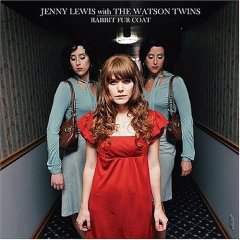
Jenny Lewis With the Watson Twins
Rabbit Fur Coat (Team Love Records)
Folk/Country
by LaTonya Taylor
"Well you praise him / Then you thank him / 'Til you reach the by and by / And I've won hundreds at the track / But I'm not betting on the afterlife / …What have I done? / Why am I always messing with / The big guns? "—from "The Big Guns"
"I didn't intend to write a bunch of songs about God," singer/songwriter Jenny Lewis told NPR's Melissa Block about her solo album, Rabbit Fur Coat. "I guess that's what happens when you're about to turn 30… maybe being broken-hearted is not the only thing you want to sing about."
Rabbit Fur Coat takes Lewis in a different direction musically as well as lyrically. The Rilo Kiley lead singer and sometime vocalist for indietronic collaboration The Postal Service moves away from indie-rock and toward folk, country and soul. Reviewers frequently compare Lewis' sound to Neko Case, Patsy Cline, Laura Nyro, and Loretta Lynn.
The result is collection of soulful, occasionally anthemic musings marked by Lewis' ambivalence toward faith and the tensions she experiences between her questions and spiritual experiences of grace and joy. She's joined by Kentucky natives The Watson Twins, who bring a southern gospel sensibility to background vocals. Tracks were recorded on tape, using vintage equipment, and an eclectic, occasionally tough-to-identify mix of instruments (including an ebow, Wurlitzer organ, and lap-steel guitar) gives a track or two an especially haunted feel.
The album opens with a mournful, blues-gospel "Run, Devil Run," before segueing into the rollicking "The Big Guns," in which Lewis laments her inability to avoid difficult questions—and asks for mercy for the tired and lonely in the world. "Rise Up With Fists!!" is a modern protest song, lamenting social ills and offering a pointed critique of prophets with suspect lives. "Rise Up" suggests that God's grace—"there but for the grace of God go I"— is the force that prevents one from hypocrisy, and posits belief—and waking and rising up—as alternatives, if not solutions.
"The Charging Sky" extends the gambling metaphor from "The Big Guns." But rather than refusing to bet on the afterlife, Lewis bets for and against: "It's a surefire bet I'm gonna die / So I'm taking up praying on Sunday nights / It's not that I believe in your Almighty / But I might as well / As insurance or bail." It further critiques indifference toward suffering and the "fear and consuming and fight" that she views as a result of "institution." The title track is a ballad in which the narrator tells the story of a coat that seems to function as a symbol of wealth, greed or status-consciousness. In interviews, Lewis doesn't say to what extent the song is autobiographical, but it seems to be a fictionalized account of her life as "a million-dollar kid"—Lewis was a child/teen actress who appeared in several commercials, television shows and films in the '80s and '90s.
"Born Secular" stands out as a kind of anti-hymn. Lewis describes herself as "born secular and inconsolable." Yet in her insistence that God goes where he wants but is "not in me"—the last word one lilting, extended note—Lewis sounds an emotional note that's not easily identified. It's not the bold rising up with fists, but it's not necessarily a longing melancholy.
The album includes several other songs with a similarly confessional tone, including the haunting "Happy" and a cover of the Traveling Wilburys' "Handle With Care." It's an honest look at the messiness of wrestling with (messing with?) the big guns—God, life, and the past—for oneself.
No comments:
Post a Comment